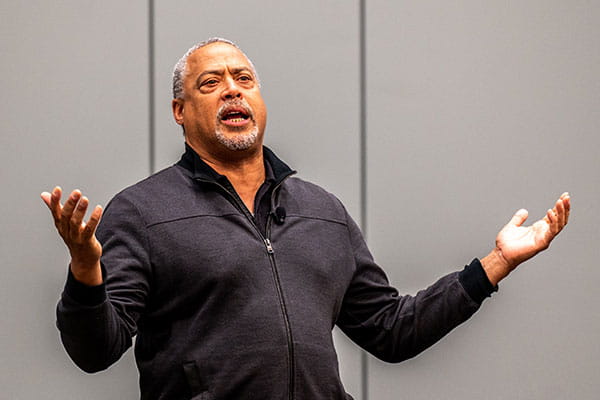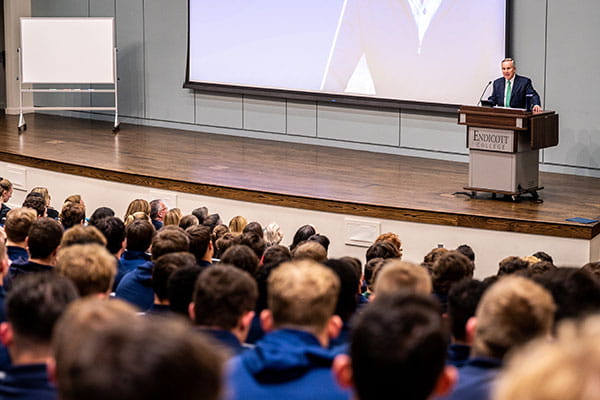Don McPherson wants men to be better. But first, we must change the way we talk about masculinity, and encourage men to talk to each other, he told a packed Cleary Lecture Hall crowd.
In a frank, sometimes funny, and deeply candid talk, McPherson—a former NFL star, College Football Hall of Famer, and the author of You Throw Like a Girl: The Blind Spot of Masculinity—addressed the Endicott community on October 19 about his experience learning, and helping other men learn, how to be a better man. The event was sponsored by the Center for Belonging & Inclusion.
“This is the first generation of young men who have heard the term masculinity discussed with ‘toxic’ as the prefix,” he said. “Before we used ‘toxic’ to talk about masculinity, we most often talked about it with waste. This is a generation of young men who’ve only heard their identity as boys to be considered waste.”
 Instead, McPherson prefers the term aspirational masculinity.
Instead, McPherson prefers the term aspirational masculinity.
“It’s not, what do we want to get rid of? It’s not, what do we want to shut down? But, what do I want for you? And I say this to men. I want men to have loving, caring, egalitarian, communicative, respectful relationships. And when I say relationships, I don’t just mean with partners, I’m talking about with each other.”
McPherson said the issues facing men are how they’re conditioned to be stoic, unflinching, determined, uncommunicative, and, to go a step further, silent.
That silence, which men internalize as strength, leads to not reaching out for help, communication incompetence, gender-based violence, and other destructive behaviors. It’s a pattern that often begins in the family, McPherson noted.
“We don’t talk about divorce, we don’t talk about grandfather being an alcoholic,” he said. “That silence, that generational trauma gets passed down. As a family we need to be able to have a difficult conversation.”
While centuries of patriarchal scaffolding still puts men at an advantage in today’s world, men are actually suffering, falling behind, killing themselves at a higher rate, killing others in mass shootings, and face an overall socioemotional deficit compared to women, McPherson noted.
All this, he said, is the “blind spot of masculinity.”
“Very often, male privilege keeps us from learning about who we are as men, because we don’t have to have the examination of masculinity,” he said. “When we truly examine men, we are weak and vulnerable and emotional and caring and loving, right? Part of the way we maintain power is to not be examined. And so the blind spot is: if we don’t examine it, we don’t get better.”
McPherson has toured almost 400 college campuses discussing masculinity. It’s a job he fell into haphazardly.
After retiring from football, he took a job at Northeastern University working with the Center for the Study of Sport in Society founded by scholar, writer, and activist Richard Lapchick. There, McPherson met Jackson Katz, who’d founded the Mentors in Violence Prevention program, which has now been adopted by various athletics programs and the U.S. military.
“I was 29 years old the first time I heard anyone talk about these issues in a real way,” McPherson reflected. “I knew they existed, I saw them. But never thought of them as being my issue. Jackson helped me see that I needed to use a privilege I didn’t know I had, because privilege is invisible until someone points out a problem I didn’t know was mine.”
McPherson later worked with the Joe Torre Foundation, which was where he first met Endicott College President Steven R. DiSalvo, Ph.D., who introduced McPherson at the event.
 Understanding that athletes are exalted in American society—and viewed as the ideal of masculinity—McPherson knows that his message, mixed with his history, is all the more compelling. He said it’s his job to break the male privilege of staying silent and discussing uncomfortable topics like sex in an open way with young people.
Understanding that athletes are exalted in American society—and viewed as the ideal of masculinity—McPherson knows that his message, mixed with his history, is all the more compelling. He said it’s his job to break the male privilege of staying silent and discussing uncomfortable topics like sex in an open way with young people.
“As a culture, we’re uncomfortable talking about sex—good, healthy, loving, and egalitarian intimacy,” he said.
He said that, in absence of honest talk from caring adults, most boys learn about sex through pornography.
“We’re not even mature enough as a culture to start talking about the impact of pornography in early stages of development and the psychosocial development of boys who observe and take in that kind of pornography,” he said. “And if that’s how men are understanding intimacy or sexual behavior, that’s really, really dangerous.”
He also noted the country’s current division but saw hope in young people.
“I truly believe that your generation is more accepting, more progressive, more loving. You’re more open to change and that’s apparent,” he said. “So I say to you, as a young person, we desperately need your generation to lead us through this.”


